
5TH ANNUAL—2025
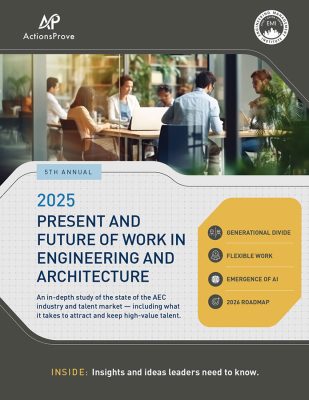
Key Topics:




Eighty-one percent of firm leaders report feeling highly engaged at work, a figure that drops by half among managers and technical staff — a dangerous disconnect between leadership and the front-facing employees closest to clients and projects.
This finding reveals just one of many fissures inside architecture and engineering (AE) firms, which are struggling to do more at lower costs, all while ensuring employees feel connected to their work and colleagues in the future of work landscape. In our 5th annual Future of Work Report, we surveyed over 500 engineers and architects in North America to understand career priorities, work hours, stress, and technology disruption (among many other issues) shaping the future of work. In comparing views by generation, gender, professional background, and seniority, the Future of Work Report offers AE organizations data-driven advice about how they can shape intelligent talent management strategies for the future of work in the coming year and beyond.
Companies that balance bottom-line objectives with quality-of-life considerations aren’t just being generous; they’re making a calculated investment in productivity, talent retention, and quality.”
—PETER C. ATHERTON, P.E.,
PRESIDENT AND FOUNDER OF ACTIONSPROVE
WHAT'S INSIDE:
- What companies can do to attract, hire, develop, and retain high-value talent.
- Industry attitudes about value-based practice models.
- How stress and burnout affect the bottom line.
- What firms can do to ensure AI tools are used safely and effectively.
- The deep tensions felt by managers, the “sandwich generation” at work.
THE HIGH COST OF INACTION
Employee stress, burnout, and low engagement directly impact business performance, yet they persist across the industry, particularly among middle managers.
AE firms face critical challenges in 2025, from persistent labor shortages and escalating costs to mounting pressure to adopt next-generation tech tools, as outlined in the Future of Work Report. Addressing these and numerous other industry hurdles demands highly skilled, motivated, and tech-savvy talent. Yet, paradoxically, many firms seem to treat effective talent management as an afterthought or neglect it entirely. There is a cost to inaction. When employees feel stress, burnout, and disengagement at work, productivity suffers and turnover rises.
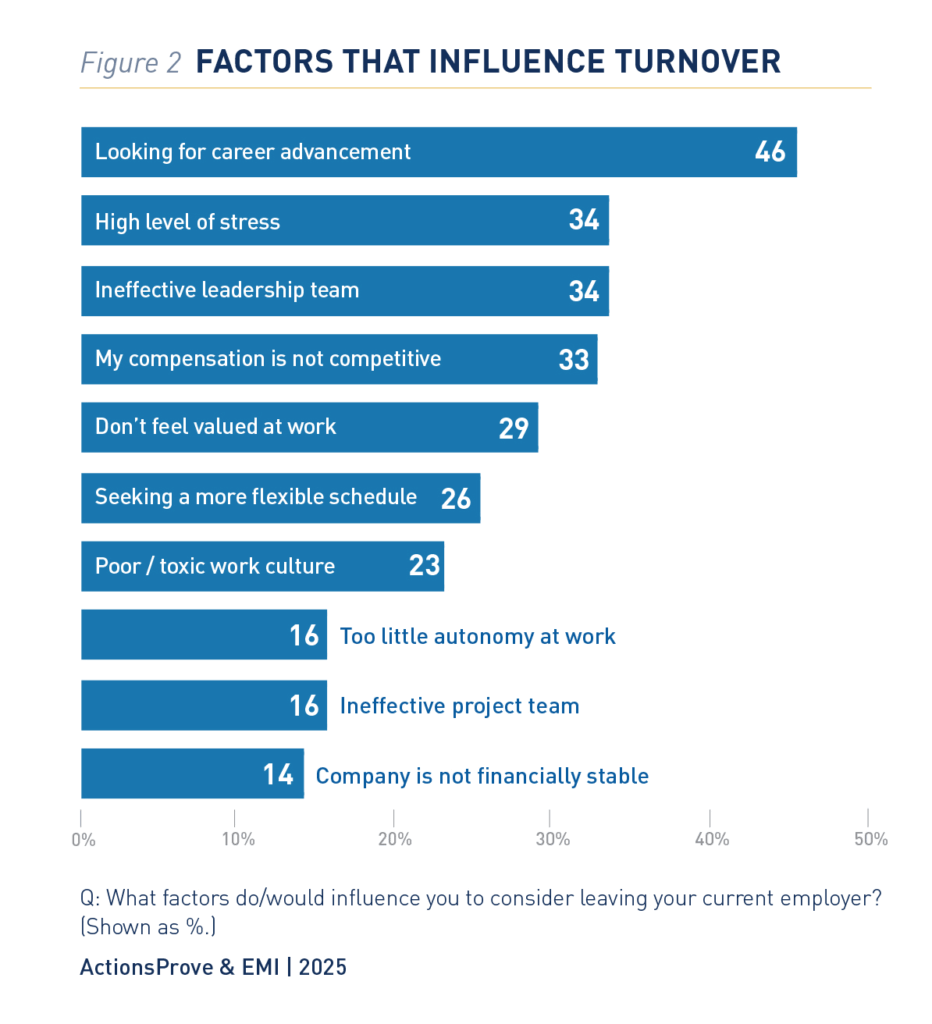
“GIVE US MORE CONTROL!”
The AE industry is still struggling to reconcile its culture of ‘paying dues’ at work with growing demands for flexibility and work-life balance.
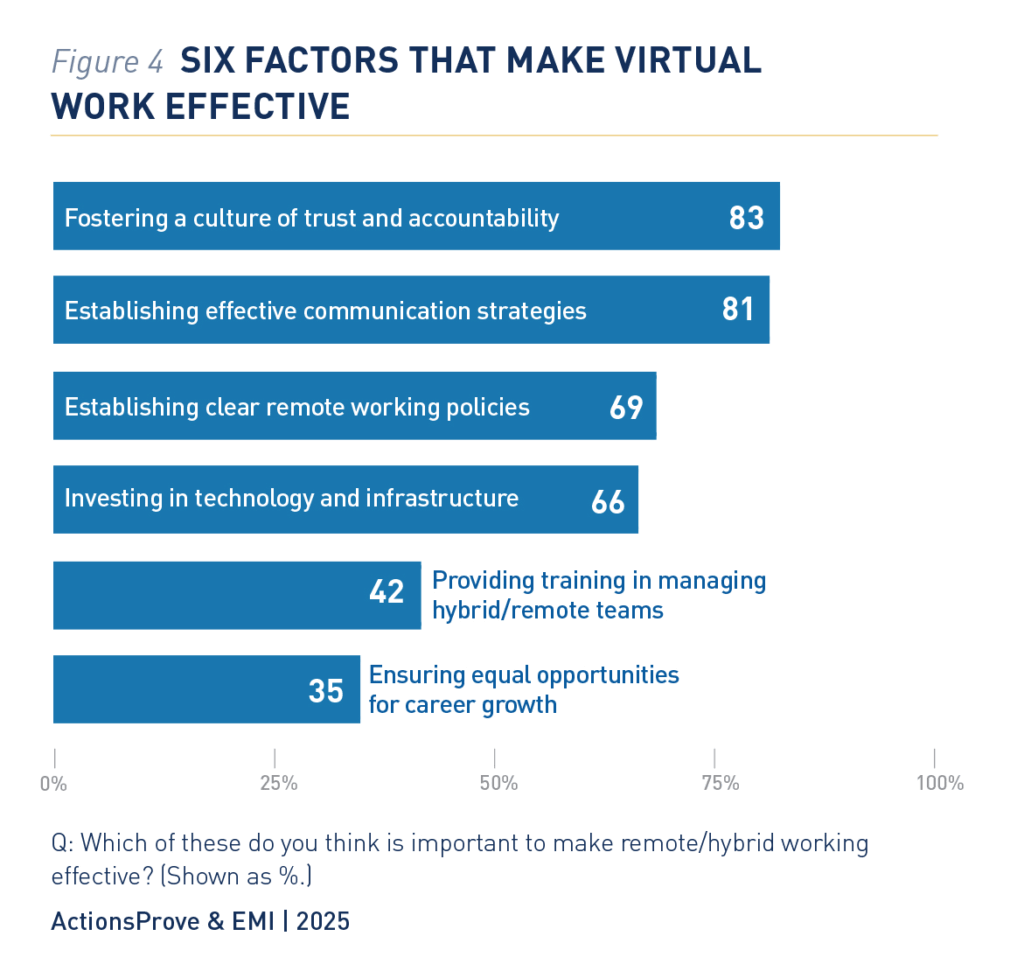
The Future of Work Report shows that despite working an average of 45 hours per week, AE professionals prefer a lighter 39-hour workload, and control matters just as much as hours. While most work only one virtual day per week, over half say they’d quit if remote work were taken away, with 76% of managers calling it a dealbreaker. The Future of Work Report also highlights that flexibility beyond location is key: 66% value the freedom to manage personal needs during work hours, with women placing even higher importance on it at 75%.
THE GENERATIONAL DIVIDE
The research shows a wide and divisive generational gap at work. Among professionals we surveyed, just 21% say different generations in their workplace collaborate “very effectively.”
Tension is rising across generations in AEC firms as younger professionals push for better work-life balance, 91% of those with under five years’ experience demand improvements, while some veteran engineers label them disloyal and lacking work ethic. Yet even among seasoned professionals, 78% agree that firms must prioritize quality of life. The Future of Work Report points to clashing workplace expectations, outdated tech infrastructure, and a growing digital skills gap as the key drivers of this disconnect, leaving no easy fix in sight.
The gap in skills and lived experience between a 30-year-old engineer and an entry-level engineer in a small firm can be dramatic. Even worse, we don’t have a diverse enough staff from an experience standpoint between those levels to always make the interactions effective.
— GEN X ENGINEER
ALIGNING TALENT & BUSINESS OUTCOMES
Can a value-based business model help firms cope with industry threats, including growing pricing pressures and a persistent skills shortage?
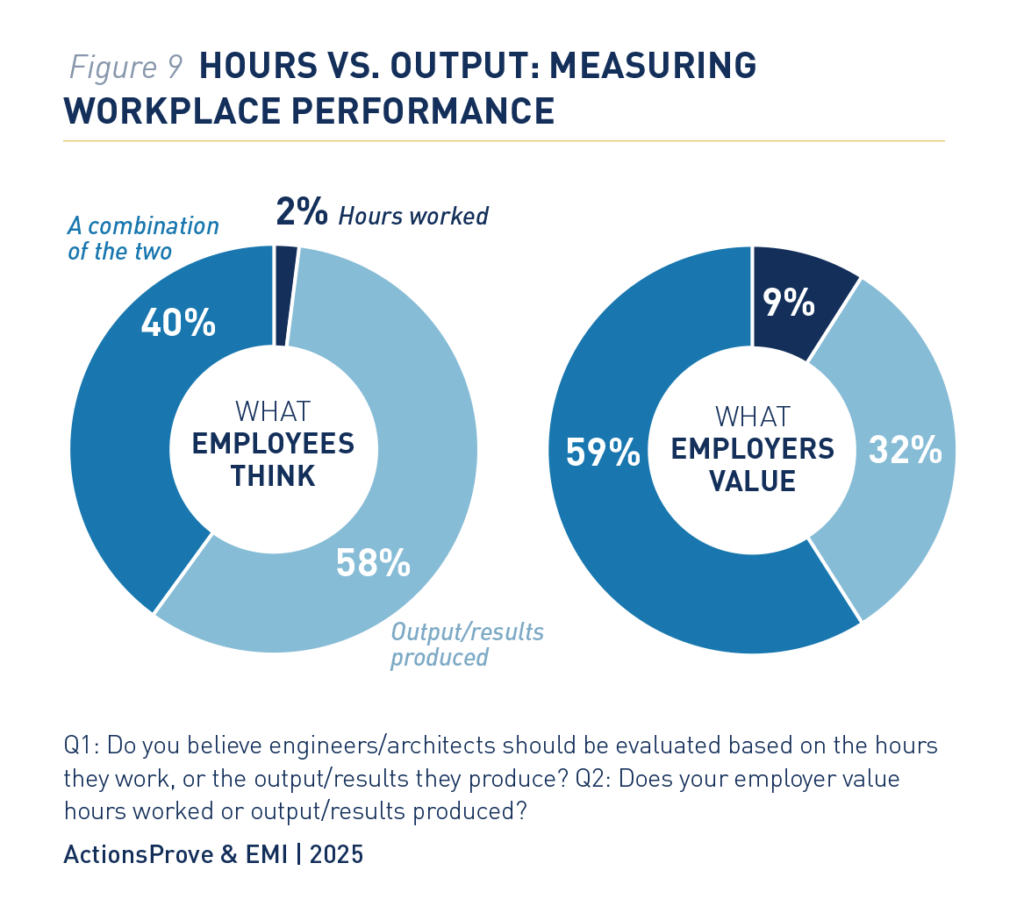
In the push for higher productivity, architecture and engineering firms are rethinking the traditional hourly billing model, a shift explored in our Future of Work Report, where many believe it is time to leave it behind. A growing number of professionals advocate for a shift to value-based billing, where fees are tied to tangible outcomes like efficiency, savings, or improved results, aligning with key findings in the Future of Work Report. While 58% of industry players support measuring output over hours, only 32% of firms have made the leap, revealing a significant gap between belief and practice in transforming how professional services are delivered.
HARNESSING AI … CAUTIOUSLY
AI is poised to transform the industry by boosting productivity and helping bridge skills gaps, but organizations should proceed with great care and caution.
Artificial intelligence is triggering the most profound shake-up in the architecture and engineering (AE) industry since the rise of CAD and BIM, with machines now capable of interpreting drawings, generating floor plans, and optimizing construction sequences. While 68% of AE professionals are curious and nearly half feel optimistic, unease lingers—mechanical engineers and architects feel the most threatened, with up to 19% expecting job displacement within five years. As AI reshapes workflows and talent needs, leaders are embracing its promise, but the human-AI balance remains a critical and uncertain frontier.
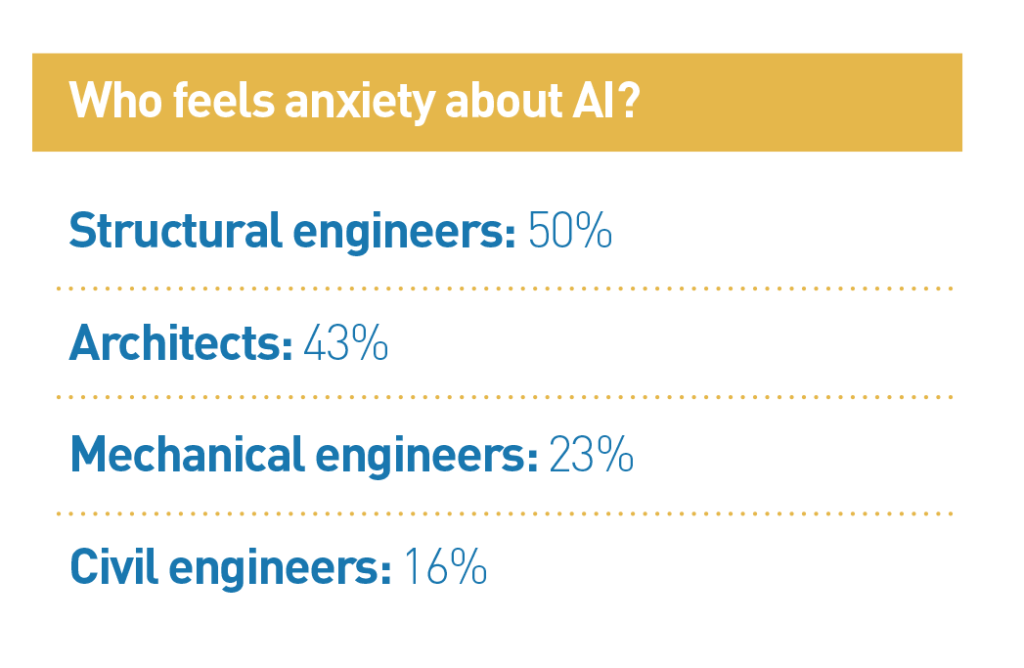
Authors

PETER C. ATHERTON, P.E.
President and Founder of ActionsProve
ActionsProve serves the AEC industry through new-era-focused strategic firm design and planning, next-level leadership development, and outside board advisory. Learn more and check out the AEC Leadership Today podcast at www.ActionsProve.com.

ANTHONY FASANO, P.E., AEC PM
Founder of The Engineering Management Institute
Engineering Management Institute helps consulting firms build professional development systems to attract, develop, and retain an engaged workforce, including people leadership and project management development programs. To learn more about their proven process, call 800-920-4007 or visit EngineeringManagement
Institute.org.
ActionsProve and the Engineering Management Institute collaborated on a survey of engineers and architects to understand how these ongoing, tectonic shifts in the nature of work are affecting the industries that hire engineers and architects, and how individuals in these fields imagine their future careers given these shifts. The study will help employers rethink their current approach to talent sourcing and challenge them to build more strategic, agile, growth-oriented and recession-proof talent ecosystems moving forward.